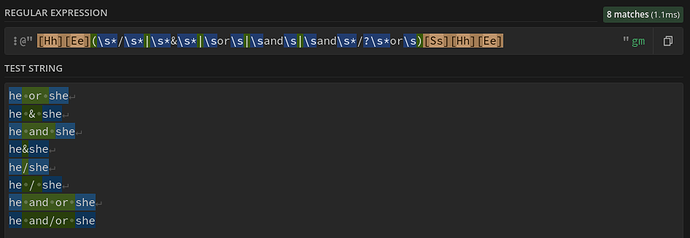Hi Jaume and Christian, thanks for your answers!
Yes, I have a few suggestions that could help me and other users with the style guide feature.
Here are four suggestions related to the style guide feature that would help me (and hopefully also help other users).
1) Verb replacements
The thing that takes up the biggest quantity of rules on my style guide are verb replacements; on my style guide, I manually replace all the verbal forms of 9 Catalan verbs, for a total of more than 600 rules. These replacements are towards verbs more commonly used in the Catalan dialect I speak (català tarragoní), but also towards verbs that I’m more used to say.
If LanguageTool had a system that it could suggest replacements for verbs, like say I could replace the entire “passejar” verb for “tombar” in just one style guide rule, without having to do such many rules; it would save up a lot of rules and a lot of time.
Although I understand that this system might be pretty complex or even directly unviable, as in languages like English, each verb only has 5 forms, but in Catalan or other languages there can be 80 or more (especially if we also replace valencian and balear forms).
As of right now, here is the list of the verbs that I manually replaced:
- passejar → tombar
- mirar → guaitar
- veure → guipar
- malvendre → abarnegar
- sortir → eixir
- gaudir → xalar
- trepitjar → palcigar
- rapar → xollar
- atipar → arrigolar
Btw, the verbs “abarnegar”, “palcigar” and “arrigolar” doesn’t seem to be in LanguageTool’s default dictionary in Catalan, even though they are acceptable verbs albeit rarely used; I had to add them in my personal dictionary.
2) Option to disable the Catalan accents diacrítics rule
This is not directly related to the style guide feature, but I’ll help to reduce the number of rules on my style guide, so I’ll say it here anyway.
I try to, whenever possible (or at least, whenever I remember… xD), use the Catalan accent diacrítics following the old rules (pre-2016 rules).
When adding an accent diacritic in a word, LanguageTool suggests removing it, as it follows the new rules, rather than the old ones, and gives the rule "Hi sobra l’accent diacrític (segons les normes noves; desactiveu la regla si voleu les normes tradicionals)". But there is no toggle to disable this rule as the message says; is this message the same from the Softcatalà corrector? (Where this same rule and such a button do exist)
For now, as a way to help in this regard, I always ignore the LanguageTool diacrític rule, and I have a few hundred custom rules on my style guide (133 to be precise) that remind be of those diacrítics when necessary. These rules could be avoided if I had a toggle in the LanguageTool’s interface to prefer the old accent diacrítics style, just how there is in the Softcatalà corrector.
Also, now that I’m asking for disabling rules, I would also like to have a way to toggle off the “Cal evitar el «‘lo’ neutre».” rule, as I use it very regularly, and I even use it as a gender-neutral pronoun in some informal contexts.
3) Allow for multiple source phrases in a single rule
On the style guide rules, you can put several replacement phrases on a single rule, but you cannot put several source phrases on a single rule. Why?
Allow me to explain it by showing this example: in my beloved català tarragoní, the adjective “arrigol” can be used (in certain contexts) as a substitute of the more common elsewhere adjectives “fart”, “tip” or “satisfet”. Currently, my style guide needs 12 individual rules for covering all the 3 source adjectives and their 4 forms of each.
Should I be allowed to place several source phrases on the same rules, the above 12 rules could be resumed on just the 4 below:
- fart,tip,satisfet → arrigol
- farta,tipa,satisfeta → arrigola
- farts,tips,satisfets → arrigols
- fartes,tipes,satisfetes → arrigoles
Here’s another example, I personally prefer to say “camí” or “volta” instead of “vegada”, “intent” or “cop” in certain contexts, so I have these 6 rules:

That could be resumed on just the 2 below:
- vegada,intent,cop → camí,volta
- vegades,intents,cops → camins,voltes
4) Allow for regular expressions in the source phrases
This is another thing that, I think, would be very useful. Having regular expressions instead of the source phrase in a rule.
Here’s an example of how a regular expression could be useful. In my style guide, I have a bunch of rules replacing the “he or she” expression with the singular they pronoun, as the webpage https://noheorshe.com suggests. But I have a bunch of different rules for all the forms of those pronouns, and different rules for different styling per pronouns (“he or she”, “he / she”, “he/she”, “he & she”, etc…).
Should regular expressions be compatible with the style guide, I could tell LanguageTool to replace everything that matches the expression
“[Hh][Ee](\s*/\s*|\s*&\s*|\sor\s|\sand\s|\sand\s*/?\s*or\s)[Ss][Hh][Ee]”
with “them” (the previous expression was in C# RegEx because that’s the one I know the most). With these expressions, all the “he or she” rules in my style guide would only take 4 rules instead of the current 48. See the picture below for how the above expression could resume 8 rules:
I also know of regex search-and-replace systems, these systems that can execute replacements within a single regex expression; should this be possible, several complex rules could be resumed in a single big regex. But I don’t if this system is in the regex system you may use, so I don’t know how viable is this.
I’m going to end this already extremely long message with a quick list of some rules in my style guide that I think they would be nice to have by default in LanguageTool:
- In British English, “lift” seems to be generally more preferred than “elevator”.
- In English, consider following the guidance of the https://noheorshe.com website and use the singular they pronoun (and their forms) as a substitute for expressions like “he or she”, “him or her”, “his or her” or “his or hers”. See the example I wrote in my point 4.
- In Catalan, suggest “des del” for the typo “desdel”; currently the only suggested replacments are “desgel”, “dèdal”, “Dèdal”, “descel” and “dessal”, and I think that “des del” is more likely in this case. I make this typo more often than I’m willing to admit… xD
- In Catalan, suggest replacing the English expression “de chill” for alternatives like “tranquil·lament”, “relaxadament”, “amb calma” or “d’estranquis”.
- In Catalan, suggest replacing the Spanish word “temazo(s)” (when referring to a really good song) with “temacle(s)”, “temarro(s)”, “cançonás(ses)”, “cançonassa(/nasses)” or “temás(sos)”. There doesn’t seem to be much consensus over which ones are better, in ésAdir, they prefer “temacle” or “temarro”, but I personally prefer the latter three…
I know that my use case of the style guide is pretty extreme, with how many custom rules I have, and that I probably have way too many rules than other people may have; but here’s hoping that this style guide feature keeps on improving with future updates.
Please let me know if you have questions about these suggestions.



